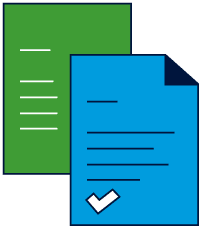The behaviour that a leader or manager walks past is the behaviour that is tolerated at the organisation. As a result, it is an all too familiar story that where there is fraud or corruption, there is often a poor organisational culture.

Common responses from employees who are found to have engaged in misconduct include ‘that’s how things have always been done around here’, ‘my manager told me to do it this way’, ‘no one was checking what I was doing’, ‘everyone is doing it', or ‘I was worried about meeting my KPIs’.
These responses can be signs that there is a poor organisational culture which tolerates or accepts fraud, corruption, or other misconduct.
Such a poor organisational culture often starts at the top from senior management, otherwise known as poor tone at the top.
Tone at the top is defined as the role played by senior management in ensuring that business integrity considerations are effectively integrated into an organisation’s decision making process.
This will allow the organisation to better mitigate the risk of being used for, engaging in, or being susceptible to one of its stakeholders engaging in serious misconduct[1]. Strong tone at the top is the cornerstone of sound business integrity.![]()
It is important to note that whilst all employees have a role to play in mitigating fraud and corruption in the organisation, the ultimate operational responsibility for fraud and corruption control foundational elements, prevention, detection, and response within an organisation rests with senior management (with oversight from governing structures like the Board, and Audit Committee or similar).
While internal auditors, external auditors, and the fraud control function play a role in assisting the organisation with fraud and corruption control, the ultimate operational responsibility rests with senior management.
The NSW Independent Commission Against Corruption (“ICAC”) has detailed that it identified the consistent and overwhelming message that corruption prevention strategies require thought, effort, and commitment from the top levels in order to succeed and that poor leadership can encourage non-compliance and corruption[2].
These words are just as applicable to those organisations in the private sector and the public sector.
Examples of fraud schemes committed by senior management due to poor tone at the top
Poor tone at the top can not only lead to employees engaging in fraud, corruption, or other serious misconduct, but it can also lead to or be exemplified by senior management engaging in such misconduct. Some examples of fraud schemes perpetrated by senior management which were caused by or which exemplified poor tone at the top include:
- Wirecard, a German electronics payments company admitted (in June 2020) that approximately 1.9 billion euros that was supposed to be held in trustee accounts in the Philippines likely did not exist. An investigation into Wirecard's financial practices uncovered a complex web of fraudulent activities, including the creation of fake profits and false transactions to inflate the company's financial position. In June 2023, their CEO, Markus Braun was arrested, and the company was declared insolvent.

- Luckin Coffee is a coffee chain in China. In April 2020, the company announced that its Chief Operating Officer (COO), Jian Liu, played a central role in orchestrating the fraudulent activities including with several other employees had fabricated sales transactions. In July 2020, Luckin Coffee announced that an internal investigation had revealed sales fraud totalling approximately $310 million.
- Satyam Indian IT company (2009) company founder and Chairman Ramalinga Raju falsified revenue by USD$1.5 billion and admitted this in a letter to the company’s Board and was found guilty along with 9 others of inflating of the company's revenue, falsifying accounts, income tax returns and more.
- WorldCom telecommunications company (2002) where assets were inflated as much as USD$11 billion, the company filed for bankruptcy, USD$180 billion in losses for investors, and those involved included the CEO Bernie Ebbers who was sentenced to 25 years imprisonment due to fraud.
- Enron energy and commodities company (2001) where shareholders lost USD$74 billion, the company filed for bankruptcy, led to the demise of the Arthur Andersen accounting firm, and those involved included the CEO Jeff Skilling (sentenced to 24 years imprisonment) and the former CEO Ken Lay (who died before being imprisoned).
Key elements of strong tone at the top
The Association of Certified Fraud Examiners (“ACFE”) details the following key elements of strong tone at the top:
- A strong value system founded on integrity;

- Create an environment in which employees feel safe to challenge management’s decisions or speak up if they think something is wrong or requires improvement;
- Have programs in place to deal with employee pressures or stresses before they escalate to the point of fraud or corruption, such as an open-door policy and an employee assistance program;
- Active listening to your employees; and
- Management that demonstrates ethical behaviour to model expected behaviour for employees, including appropriate following of organisation policies and Code of Conduct.
The NSW ICAC details some additional elements of strong tone at the top, where senior leaders should[3]:
- Not exempt themselves from policy and procedure requirements to which other staff are expected to adhere;
- Personally attend code of conduct, ethics, and corruption training, even if they feel they already understand the content;
- Disclose their own actual or perceived conflicts of interest and visibly comply with the organisation’s gifts and benefits policy;
- Devote sufficient resources to preventing, detecting, and investigating misconduct;

- Personally reward or praise subordinates and colleagues that behave ethically;
- Refrain from setting unrealistic incentives, such as formal key performance indicators that could drive unethical behaviour (particularly unrealistic goals) or informal cues (for examples, telling someone to “just get it done, I don’t care how”);
- Get involved in approving and promoting key policies such as the agency’s code of conduct and look for opportunities to raise ethics and anti-corruption messages outside of formal training;
- Encourage a ‘speak up’ culture, where staff can voice concerns about unethical conduct or weaknesses in internal controls that make the organisation vulnerable to fraud or corruption;
- Act on red flags of fraud and corruption, such as refusing to take annual leave, living beyond ones means, or resisting accountability or training; and
- Welcome internal or external audits as an opportunity to improve existing processes.
Specifically in relation to fraud and corruption control, senior management should implement internal controls and commit to a culture of fraud and corruption prevention, detection, and response, including the following measures:
- A zero-tolerance statement regarding fraud and corruption;
- Performing regular fraud and corruption risk-assessments (at a minimum every two (2) years) or ‘pressure testing deep dives’ into business processes which incorporate assessing fraud and corruption vulnerabilities;

- Employee fraud and corruption control awareness training;
- A dedicated fraud control function and person responsible for leading the operational coordination of the fraud and corruption control system or framework;
- A robust whistleblower or Public Interest Disclosure (“PID”) hotline / reporting avenue(s) and protection policy (the ACFE Occupational Fraud 2024: Report to the Nations details that 48% of fraud detected across the Asia Pacific region is detected via whistleblower tips. If an organisation has no whistleblower reports, it may be symptomatic of a low tone at the top environment and lack of employee awareness);
- Robust process for handling conflicts of interest and gifts & benefits; and
- Robust and consistent process for handling identified fraud or corruption events, including a preferred external investigation provider such as RSM Australia’s Fraud & Forensic Services team if an organisation does not have the internal resources.
Other benefits to your organisation of strong tone at the top
Strong tone at the top provides many additional benefits to fraud and corruption prevention, detection, and response, including:
- A positive culture throughout the organisation;
- Fewer instances of bullying and harassment;
- Increased diversity and inclusion in the workplace;
- Increased employee productivity and engagement;
- Collaborative and innovative thinking and ideas;
- Higher employee retention (and therefore less cost in hiring and training new employees); and
- Decreased risk of reputational damage for the organisation.
FOR MORE INFORMATION
Please do not hesitate to contact RSM Australia Partner Roger Darvall-Stevens, Senior Manager Milind Sheth, Manager Chris Scott, or any others in RSM’s Fraud & Forensic Services team to discuss how your organisation can enhance its tone at the top and ethical culture or discuss how we can help your organisation with fraud and corruption control better practice.
[1] Organisation for Economic Cooperation and Development (OECD)
[3] ibid.






